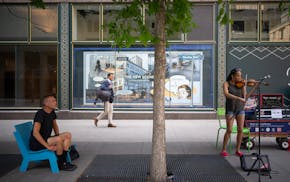The cop who made Minneapolis less safe is walking away from the job.
Lt. Bob Kroll, president of the Minneapolis police union, plans to retire at the end of the month, after 32 years on the force.
He leaves behind a disciplinary file crammed with lawsuits and allegations of excessive force, wrongful arrests and racism; several consecutive mayors and police chiefs who describe him as a disgrace to the badge; and a pile of Cops for Trump shirts.
"Good riddance," Minneapolis Mayor Jacob Frey tweeted, as news spread.
Kroll devoted his 25 years on the board of the Police Officers Federation of Minneapolis to blocking every effort at reform and any effort to discipline or weed out the unfit, the corrupt, the violent, the bigoted from the force.
On his way out the door, he sat down for a chat with WCCO Radio.
In this safe space, podcast host Roshini Rajkumar — a good friend of the Kroll family — tossed softball after softball. But it's never a good sign when even your friends open the exit interview with a question like, "Are you a member of the KKK?"
Instead of recoiling in horror at the idea of being linked to a vile hate group or condemning the Ku Klux Klan and everything it holds dear, Kroll chuckled. No, I'm not, he said, there is no evidence to back up that claim.
Kroll easily dispensed with Rajkumar's question about whether he was in Washington on Jan. 6, as had been speculated in social media as soon as reports surfaced of rioters flashing police badges. He said he was home, definitely not at the Capitol.
Kroll has not given the Star Tribune a quote since 2019, when Libor Jany reported accurately that Kroll is married to WCCO-TV reporter Liz Collin.
But the burning question isn't "Is the KKKroll nickname accurate?" or "Were you — the president of the Minneapolis police union — part of the mob that stormed the U.S. Capitol on Jan. 6?"
The question for Bob Kroll — who was once held up as an example of MPD's culture of institutional racism in a federal lawsuit filed by the current chief of police — is why. Why is it so easy for the people you were paid to protect and serve to picture you as part of a violent mob?
Kroll hopes his legacy will be the commendations in his personnel file. The cops he stood up for, the victims he comforted, the harrowing days he spent on the site of the I-35W bridge collapse.
But when Rajkumar asked him about Jan. 6, Kroll did not mention the killing of Capitol Police Officer Brian Sicknick by a mob waving Trump flags. He mentioned how great the stock market is doing these days.
He talked about how his critics probably were not from Minneapolis and anyway, his critics were probably being paid by George Soros, the billionaire philanthropist and political donor.
He did not talk about what a huge anti-Semitic red flag it is to blame all your woes on wealthy Jews.
He talked about the thin blue line, a symbol of law enforcement holding the forces of anarchy at bay.
He did not talk about how a mob wearing thin blue line patches trampled a woman to death in its rush to beat police officers bloody with poles bearing the American flag.
Kroll defended President Donald Trump, who had invited the mob to D.C. and ordered it to march on the Capitol to disrupt the certification of the election he had lost.
But then again, Kroll said, "I really didn't follow it all that closely."
So how will residents most remember his tenure as union boss? The charred rubble of the Third Police Precinct station. A Christmas tree in a north Minneapolis precinct, covered in racist garbage. Graves and grieving families and a police force and a community terrified of each other.
Bob Kroll is walking away from the job.
Good riddance, Bob Kroll.

Brooks: A tale of 124 hoarded Minnesota cats has at least a hundred happy endings

Brooks: The end of the line for Minneapolis' longest-serving bus driver and the start of a new adventure

Brooks: If Uber and Lyft let Minnesota down, maybe Metro Transit will pick us up

